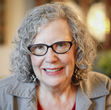N.J. Lindquist's Blog, page 2
October 13, 2022
Reflections on My Friend, Author Ray Wiseman
Winner of the 2009 Leslie K. Tarr Award as well as a number of individual The Word awards, author of eight books as well as ten technical manuals and more than 1,000 editorials, newspaper features, and columns, Fergus Ontario’s Ray Wiseman, like The Little Engine That Could, kept plugging away, overcoming obstacle after obstacle.
The son of an English Boer-war veteran and his third wife, Ray was born in England during the Depression. He was two when they returned to their farm home in Alberta, six when his father was hospitalized. His mother managed to raise her two sons and baby daughter on her own, but life was hard.
Young Ray loved making up stories. “I always wanted to write. I’d write short stories and stuff them in a drawer, then throw them away months or years later.” But school was difficult. “I failed grade two because I could not copy from the blackboard. I would transpose numbers and letters.” Years later, he learned about dyslexia, but back in those days, you simply coped. He left school after grade nine to get a job and help his mother.
While a teen, Ray and his family moved to London, Ontario where he worked in a radio shop. His boss recommended a correspondence course from Radio College of Canada. They were reluctant to take him, but Ray completed the 18-month course in 12 months.
Two years later, Ray met his future wife, Anna, in Woodstock, Ontario. Shortly after their marriage, they began an electronics business in Woodstock, but despite its success, Ray wanted more.
In his late twenties, Ray and Anna and their two young sons moved to Briercrest Bible College in Saskatchewan. While there, Ray wrote his first published piece, a letter to the editor.
Next, Ray pastored a church for two years, but finding it impossible to care for his growing family (now four sons) on the small salary, he took a job with the cable company in London, Ontario.
But in 1971, again feeling a call to full-time ministry, Ray and his family moved to Africa to work with Africa Evangelical Fellowship. They returned to Canada and the cable company in 1976.
Ray still felt restless. Most of all, he wanted the education he had missed. He earned a Bachelor of Arts degree from the University of Waterloo by taking correspondence courses. He also upgraded his Briercrest diploma to a degree. During this time, the writer within Ray began to re-emerge. “You do a lot of writing when studying this way and I honed my skills on essays.”
His new abilities didn’t go unnoticed. Rogers Engineering asked Ray to take over the technical writing and publications. “I didn’t have the confidence to ask for the job, but they came to me!” He wrote ten technical manuals.
Soon he was also writing and editing for Partners Magazine, published by Partners International.
Then Ray took a giant step. “One day I read a secular publication intended for seniors. It was so negative! I wrote a series of upbeat columns. They rejected them, but our local paper accepted them."
Ray continued writing weekly and monthly columns for the Guelph Mercury and The Wellington Advertiser for about 11 years. However, in 1993, Ray left Rogers to write and speak full-time.
Ray also wrote three biographies of living international Christian heroes for Partners International: I Cannot Dream Less (Chris Marantika); Disciples of Joy (Anand Chaudhari)—a Canadian best-seller; and A Bridge to the Mountain (Paul Chang).
Writing became the ministry Ray sought after. His desire, for both Christian and secular audiences, was “to communicate positive messages firmly grounded in a Christian world view.”
Ray gave special credit to three women for helping him become a writer.
“My mother was a great story teller and letter writer. She always wanted to write a book. I guess I did it for her when I published A Difficult Passage (the story of Ray’s early years). It is as much her story as mine.”The second was Briercrest English and Missions teacher, Mrs. Myrtle Wipf, who encouraged him to write.The most important one was his wife. “Anna reads everything I write. Without her proofreading skills, life would be much harder. Where I have difficulty, she does not. She is also more of a detail person, more capable of linear logic, while I am more contextual.”I (N. J.) first met Ray at a God Uses Ink conference in Toronto back in the late 1980s. We seemed to have the same independent spirit and he was a few steps ahead of me. From then on, we always managed to have at least one meal together at the annual conferences we attended.
When I decided to republish my first book independently after getting the rights back, it was Ray who shared what he'd learned about publishing the books with Partners International. He also introduced me to his distributor, who accepted my books. We later both moved to a new distributor when the first one wasn't able to keep going in the competitive market. Ray and I, and sometimes other authors, did a number of book signings together, and on occasion I stayed with him and Anna and they stayed at our house.
I think part of what drew me to Ray was that my dad had also been dyslexic (which led at least one teacher to call him stupid), and he, too, had fought hard to have a successful life as a businessman even though both reading and writing were difficult for him. But, unlike my dad, I could talk to him about virtually anything and get a well-thought-out response.
The other non-writing thing we had in common was that we each had four sons (which makes for a lively family!) His sons were older than mine, but we always checked on how each others' family members were doing. And Ray always updated me on how the young woman who had become his and Anna's "adopted" daughter was doing, too.
Ray and I were both founding members of The Word Guild, which took over the God Uses Ink Conference in the fall of 2001, and eventually changed the conference's name to Write! Canada. Ray was a member of the first Board, and he soon became a speaker and mentor at the annual conferences. We were two of a small group of writers and editors who made the conference a priority each year. Anna would often come over, too, after the conference ended up in Guelph. Not to attend classes, but to help out so others could attend them.
While I knew Ray first, after The Word Guild started, my husband, Les, became involved as the treasurer. He started coming to our conferences and so forth, and thus also came to know Ray, not only as a friend but also an editor and mentor after Les decided to do some writing of his own.
I was honoured to write the foreward to Ray's memoir, A Difficult Passage: From prairie poverty to heights beyond. I still love the book. One of the disadvantages of indie publishing is not getting the attention your work might deserve.
I copied the foreward I wrote and posted it below.
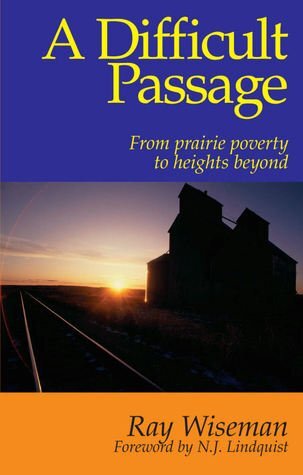
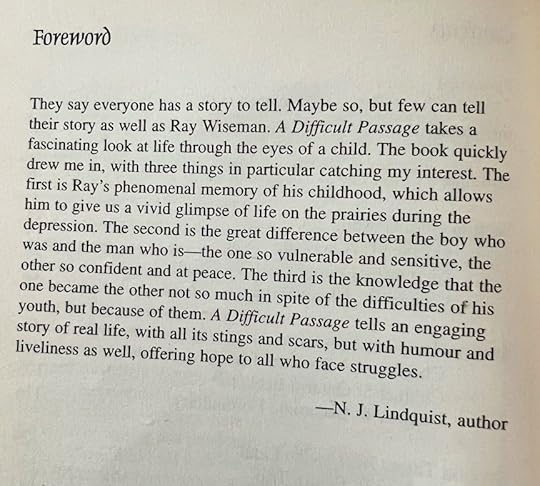
On June 17, 2009, at the Gala at the World Vision headquarters in Mississauga, Ontario, Ray received the 2009 Leslie K. Tarr Award for Outstanding Career Achievement. Named in honour of its first recipient, the late Leslie K. Tarr, a Toronto journalist, editor, and teacher, the Tarr Award celebrates a major career contribution to Christian writing and publishing in Canada. Previous recipients include author Rudy Wiebe and poet Margaret Avison, both two-time Governor General's Literary Award winners, and Janette Oke, whose inspirational novels have sold over 28 million copies.
Because Anna was so integral to Ray's career, largely because of his dyslexia, she was given her own award.
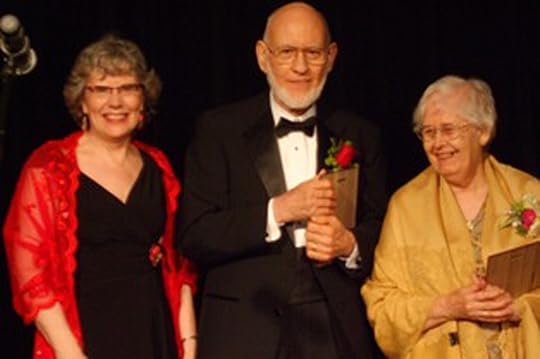
I was pleased to present Ray Wiseman with the 21st Leslie K. Tarr Award. Because of her contribution to his writing, his wife Anna received a special award, too!
Parts of the above were taken from a story I wrote on Ray in 2003 for my column "The Inside Story" in Christian Week. Here are a few things Ray told me that didn't get into that story (750 words is so short!):
People have credited me with being a philosopher—with at least asmall degree of accuracy.I deal with issues, sometime over a period of years, then make
adjustments to bring my life into harmony with my new philosophy—
almost like a conversion experience.I gave up a good business to go to Bible college.I reversed inbred cultural patterns when I gave up hunting and later
became a pacifist.I became a vegetarian when I faced third-world hunger.I broke with religious indoctrination when I began promoting women
as equals in the church and in ministry. (Actually, I don't believe
in equality of the sexes—I have known since I was a kid that women
have the edge in most things!)
And I'll add that he kind of liked being called a "curmudgeon" although anyone who knew him well knew that at heart he was actually more like a teddy bear.
In her latter years, Anna was diagnosed with Alzheimers and eventually had to be put into a nearby long term care home. She passed away on July 24, 2018.
One of Ray's last stories was "'Til Death Do Us Part," which was published in Hot Apple Cider with Cinnamon in 2017.
Here is a short excerpt:
“Don’t you love me any more? You don’t show affection; you never hug me.” The note inscribed in Anna’s flawless handwriting contained no salutation or signature. She had left it with the pen on her bedside table as though planning to return and write more. But the chances of that happening were one in a billion. She would no more remember writing the note than she would remember my hug that morning, or the “I love you” I had whispered in her ear.
When she wrote that note, I had loved Anna unconditionally for more than 60 years. But she had forgotten. And I had much more to learn about love....
Those of us who knew Ray and Anna will miss them both. But at the same time, we're happy they're no longer apart.
The last picture I have of Ray was taken December, 2017, at Roxanne's Reflections Book & Card Shop in Fergus, Ontario. We were promoting our latest anthology with some of the contributing writers.
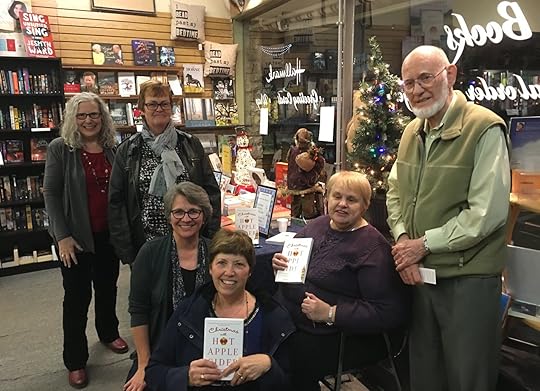
From left, me, Theresa Goldrick, Robin (R. K.) Livingstone, Glynis Belec, Valentia Gal, Ray.
Ray's BooksI Cannot Dream Less A Bridge to the MountainDisciples of JoyAunt Harri Walks the LineA Difficult PassageWrite Better! A Writing Tip for Every Week of the YearExploring God's Route 66 (by Ray Wiseman and Anna Wiseman)When Cobras Laugh (by Don Ranney and Ray Wiseman)Echoes from the Hill Top (with 7 other writers from his church)Ray also has stories in Hot Apple Cider, Hot Apple Cider with Cinnamon, and Christmas with Hot Apple Cider. Two of them were short-listed for The Word Awards, and "Until Death Do Us Part" won.Most of his books are still available. Here is a link to Chapters/Indigo/Kobo.
The post Reflections on My Friend, Author Ray Wiseman appeared first on N. J. Lindquist.
Reflections on My Friend, Ray Wiseman
Winner of the 2009 Leslie K. Tarr Award as well as a number of individual The Word awards, author of eight books as well as ten technical manuals and more than 1,000 editorials, newspaper features, and columns, Fergus Ontario’s Ray Wiseman, like The Little Engine That Could, kept plugging away, overcoming obstacle after obstacle.
The son of an English Boer-war veteran and his third wife, Ray was born in England during the Depression. He was two when they returned to their farm home in Alberta, six when his father was hospitalized. His mother managed to raise her two sons and baby daughter on her own, but life was hard.
Young Ray loved making up stories. “I always wanted to write. I’d write short stories and stuff them in a drawer, then throw them away months or years later.” But school was difficult. “I failed grade two because I could not copy from the blackboard. I would transpose numbers and letters.” Years later, he learned about dyslexia, but back in those days, you simply coped. He left school after grade nine to get a job and help his mother.
While a teen, Ray and his family moved to London, Ontario where he worked in a radio shop. His boss recommended a correspondence course from Radio College of Canada. They were reluctant to take him, but Ray completed the 18-month course in 12 months.
Two years later, Ray met his future wife, Anna, in Woodstock, Ontario. Shortly after their marriage, they began an electronics business in Woodstock, but despite its success, Ray wanted more.
In his late twenties, Ray and Anna and their two young sons moved to Briercrest Bible College in Saskatchewan. While there, Ray wrote his first published piece, a letter to the editor.
Next, Ray pastored a church for two years, but finding it impossible to care for his growing family (now four sons) on the small salary, he took a job with the cable company in London, Ontario.
But in 1971, again feeling a call to full-time ministry, Ray and his family moved to Africa to work with Africa Evangelical Fellowship. They returned to Canada and the cable company in 1976.
Ray still felt restless. Most of all, he wanted the education he had missed. He earned a Bachelor of Arts degree from the University of Waterloo by taking correspondence courses. He also upgraded his Briercrest diploma to a degree. During this time, the writer within Ray began to re-emerge. “You do a lot of writing when studying this way and I honed my skills on essays.”
His new abilities didn’t go unnoticed. Rogers Engineering asked Ray to take over the technical writing and publications. “I didn’t have the confidence to ask for the job, but they came to me!” He wrote ten technical manuals.
Soon he was also writing and editing for Partners Magazine, published by Partners International.
Then Ray took a giant step. “One day I read a secular publication intended for seniors. It was so negative! I wrote a series of upbeat columns. They rejected them, but our local paper accepted them."
Ray continued writing weekly and monthly columns for the Guelph Mercury and The Wellington Advertiser for about 11 years. However, in 1993, Ray left Rogers to write and speak full-time.
Ray also wrote three biographies of living international Christian heroes for Partners International: I Cannot Dream Less (Chris Marantika); Disciples of Joy (Anand Chaudhari)—a Canadian best-seller; and A Bridge to the Mountain (Paul Chang).
Writing became the ministry Ray sought after. His desire, for both Christian and secular audiences, was “to communicate positive messages firmly grounded in a Christian world view.”
Ray gave special credit to three women for helping him become a writer.
“My mother was a great story teller and letter writer. She always wanted to write a book. I guess I did it for her when I published A Difficult Passage (the story of Ray’s early years). It is as much her story as mine.”The second was Briercrest English and Missions teacher, Mrs. Myrtle Wipf, who encouraged him to write.The most important one was his wife. “Anna reads everything thing I write. Without her proofreading skills, life would be much harder. Where I have difficulty, she does not. She is also more of a detail person, more capable of linear logic, while I am more contextual.”I (N. J.) first met Ray at a God Uses Ink conference in Toronto back in the late 1980s. We seemed to have the same independent spirit and he was a few steps ahead of me. From then on, we always managed to have at least one meal together at the annual conferences we attended.
When I decided to republish my first book independently after getting the rights back, it was Ray who shared what he'd learned about publishing the books with Partners International. He also introduced me to his distributor, who accepted my books. We later both moved to a new distributor when the first one wasn't able to keep going in the competitive market. Ray and I, and sometimes other authors, did a number of book signings together, and on occasion I stayed with him and Anna and they stayed at our house.
I think part of what drew me to Ray was that my dad had also been dyslexic (which led at least one teacher to call him stupid), and he, too, had fought hard to have a successful life as a businessman even though both reading and writing were difficult for him. But, unlike my dad, I could talk to him about virtually anything and get a well-thought-out response.
Ray and I were both founding members of The Word Guild, which took over the God Uses Ink Conference in the fall of 2001, and eventually changed the conference's name to Write! Canada. Ray was a member of the first Board, and he soon became a speaker and mentor at the annual conferences. We were two of a small group of writers and editors who made the conference a priority each year. Anna would often come over, too, after the conference ended up in Guelph. Not to attend classes, but to help out so others could attend them.
While I knew Ray first, after The Word Guild started my husband, Les, became the treasurer and also came to know Ray, not only as a friend, but also an editor and mentor after Les decided to do some writing of his own.
I was honoured to write the foreward to Ray's memoir, A Difficult Passage: From prairie poverty to heights beyond. I still love the book. One of the disadvantages of indie publishing is not getting the attention your work might deserve.
I copied the foreward I wrote and posted it below.


On June 17, 2009, at the Gala at the World Vision headquarters in Mississauga, Ontario, Ray received the 2009 Leslie K. Tarr Award for Outstanding Career Achievement. Named in honour of its first recipient, the late Leslie K. Tarr, a Toronto journalist, editor, and teacher, the Tarr Award celebrates a major career contribution to Christian writing and publishing in Canada. Previous recipients include author Rudy Wiebe and poet Margaret Avison, both two-time Governor General's Literary Award winners, and Janette Oke, whose inspirational novels have sold over 28 million copies.
Because Anna was so integral to Ray's career, largely because of his dyslexia, she was given her own award.

I was pleased to present Ray Wiseman with the 21st Leslie K. Tarr Award. Because of her contribution to his writing, his wife Anna received a special award, too!
Parts of the above were taken from a story I wrote on Ray in 2003 for my column "The Inside Story" in Christian Week. Here are a few things Ray told me that didn't get into that story (500 words is so short!):
People have credited me with being a philosopher—with at least asmall degree of accuracy.I deal with issues, sometime over a period of years, then make
adjustments to bring my life into harmony with my new philosophy—
almost like a conversion experience.I gave up a good business to go to Bible college.I reversed inbred cultural patterns when I gave up hunting and later
became a pacifist.I became a vegetarian when I faced third-world hunger.I broke with religious indoctrination when I began promoting women
as equals in the church and in ministry. (Actually, I don't believe
in equality of the sexes—I have know since I was kid that women
have the edge in most things!)
And I'll add that he kind of liked being called a "curmudgeon" although anyone who knew him well knew that at heart he was actually more like a teddy bear.
In her latter years, Anna was diagnosed with Alzheimers and eventually had to be put into a long term care home. She passed away on July 24, 2018.
One of Ray's last stories was "'Til Death Do Us Part," which was published in Hot Apple Cider with Cinnamon in 2017.
Here is a short excerpt:
“Don’t you love me any more? You don’t show affection; you never hug me.” The note inscribed in Anna’s flawless handwriting contained no salutation or signature. She had left it with the pen on her bedside table as though planning to return and write more. But the chances of that happening were one in a billion. She would no more remember writing the note than she would remember my hug that morning, or the “I love you” I had whispered in her ear.
When she wrote that note, I had loved Anna unconditionally for more than 60 years. But she had forgotten. And I had much more to learn about love....
Those of us who knew Ray and Anna will miss them both. But at the same time, we're happy they're no longer apart.
The last picture I have of Ray was taken December, 2017, at Roxanne's Reflections Book & Card Shop in Fergus, Ontario. We were promoting our latest anthology with some of the contributing writers.

From left, me, Theresa Goldrick, Robin (R. K.) Livingstone, Glynis Belec, Valentia Gal, Ray.
Ray's BooksI Cannot Dream Less A Bridge to the MountainDisciples of JoyAunt Harri Walks the LineA Difficult PassageWrite Better! A Writing Tip for Every Week of the YearExploring God's Route 66 (by Ray Wiseman and Anna Wiseman)When Cobras Laugh (by Don Ranney and Ray Wiseman)Echoes from the Hill Top (with 7 other writers from his church)Ray also has stories in Hot Apple Cider, Hot Apple Cider with Cinnamon, and Christmas with Hot Apple Cider. Two of them were short-listed for The Word Awards, and "Until Death Do Us Part" won.Most of his books are still available. Here is a link to Chapters/Indigo/Kobo.
The post Reflections on My Friend, Ray Wiseman appeared first on N. J. Lindquist.
February 19, 2022
New Covers for All My Books!
I know you haven't heard from me in a while. I'll be posting a blog about that shortly. But for now, let me update you on what I've been very slowly working on over the last few months. New covers. For all my books.
The contents of the books themselves haven't changed. Just the covers.
Believe it or not, this is quite normal because fashions change in book covers just as they do on clothing and funiture styles. A few of my earlier books have had 3 or even 4 different covers at this point.
For a short time, as we make the changeover everywhere, you might see more than one cover for each book.
So, here you go.
The new covers of my YA books on top with the last two old ones below them: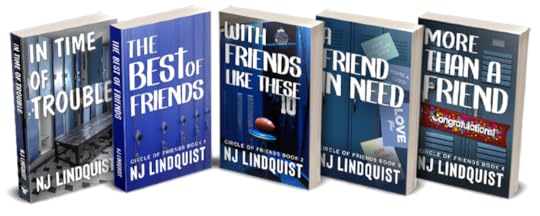
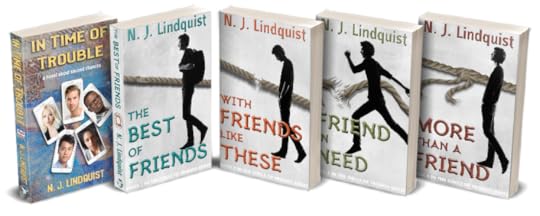
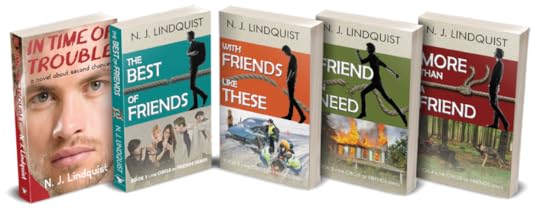 The new covers of the Hot Apple Cider books with the old ones below them:
The new covers of the Hot Apple Cider books with the old ones below them:
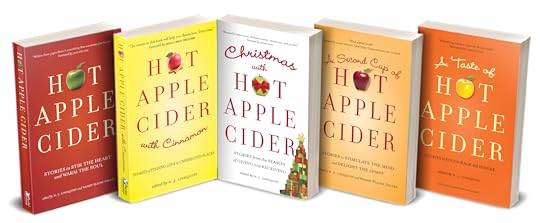 The new covers of my mysteries with the old ones below them:
The new covers of my mysteries with the old ones below them:
 I even got a new cover for the fantasy I released only a year ago! The new one is on the left.
I even got a new cover for the fantasy I released only a year ago! The new one is on the left.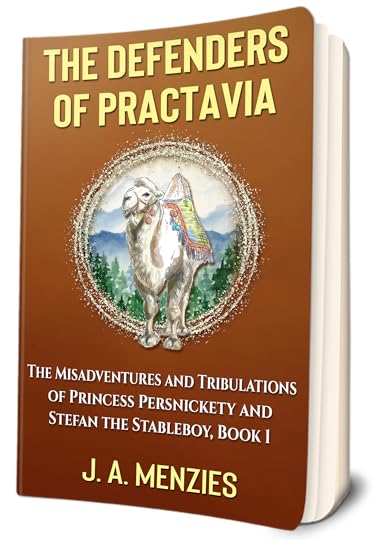
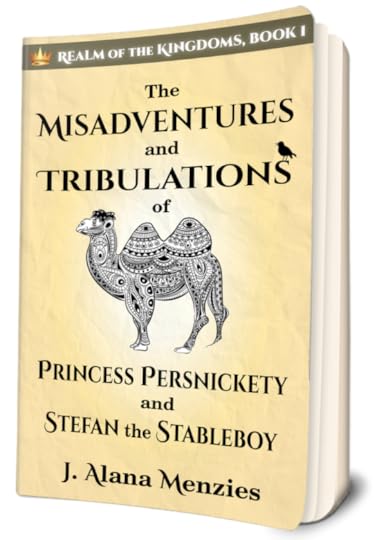
The post New Covers for All My Books! appeared first on N. J. Lindquist.
New Covers Are Coming for All My Books!
I know you haven't heard from me in a while. I'll be posting a blog about that shortly. But for now, let me update you on what I've been very slowly working on over the last few months. New covers. For all my books.
The contents of the books themselves haven't changed. Just the covers.
Believe it or not, this is quite normal because fashions change in book covers just as they do on clothing and funiture styles. A few of my earlier books have had 3 or even 4 different covers at this point.
For a short time, as we make the changeover everywhere, you might see more than one cover for each book.
So, here you go.
The new covers of my YA books on top with the last two old ones below them: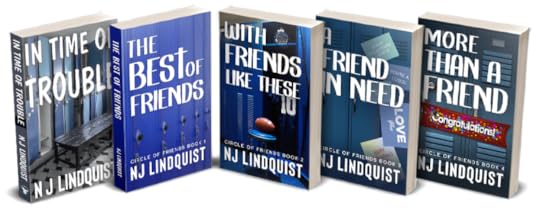

 The new covers of the Hot Apple Cider books with the old ones below them:
The new covers of the Hot Apple Cider books with the old ones below them: [image error] The new covers of my mysteries with the old ones below them:
[image error] The new covers of my mysteries with the old ones below them:
 I even got a new cover for the fantasy I released only a year ago! The new one is on the left.
I even got a new cover for the fantasy I released only a year ago! The new one is on the left.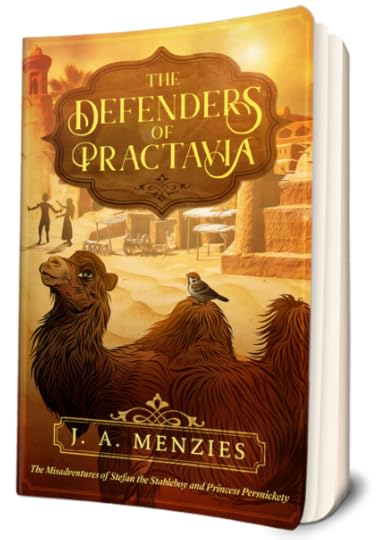

The post New Covers Are Coming for All My Books! appeared first on N. J. Lindquist.
April 29, 2021
A Routine Medical Appointment Turns Scary
As I write this, it’s been 2 1/2 years since I had breast cancer surgery. And on May 22nd, it will be two years since I finished both the chemo and radiation I was given after my cancer turned out to be the triple negative variety. (I have other blogs where I talk about my journey and the side effects.)
Roughly a year after I finished the chemo, I was just beginning to feel more energy and more “brain.” I went back to writing my LoveChild blogs, started to think about working on a book, and even did some marketing.
By July, 2020, in spite of the pandemic, I was feeling almost normal. I'd even finished and published a middle grade fantasy.
However, on August 16, 2020, I had the first of what were planned to be six injections of zoledronic acid—a drug that helps prevent bone cancer and also treats osteoporosis (which chemo can cause or make worse). Immediately after the injection, I went back to having very low energy and very little brain.
When I say "low energy," I mean that at any given moment, while I could think of 20 things I really wanted to do and should do, most of the time, I'd reject them all in favour of reading another light mystery novel on my Kindle. And no, it didn't have to be a good novel.
Since then, I’ve been gradually getting a little more energy, but still not much. So I was very reluctant to get the second zoledronic acid injection in February when it was scheduled.
As it turned out, Covid pushed my appointment into May, and I can’t say I was sorry. Which brings me to this month.
Routine Blood TestOn Monday, April 12, I had an appointment at the hospital cancer unit at 1:30 to have some blood tests done. That's standard for getting chemo or zoledronic acid. Normally, you have the blood test, see the oncologist an hour later, and if everything's good, have the treatment after that.
However, back in February, when I got the phone call delaying the appointment, I was told that the blood test would be on Monday and I'd see the oncologist and get the zoledronic acid the following day.
This was new, so I questioned the times, and read what I'd written down, and was told I’d written the times down correctly. So I just assumed that because of the pandemic, they didn’t want people hanging around the hospital for an hour. Since we live about a ten-minute walk from the hospital, it was no problem either way.
That Monday was a somewhat rainy and chilly day, so Les dropped me off at the hospital and drove off to park a couple of blocks away and walk in the area. (Since he hasn't been able to swim for the last year, he's been forced to walk every day instead.) We expected me to be there only a few minutes, so he'd be handy to pick me up when I was done.
When I checked in at 1:15, they told me I’d have the blood test right there (instead of in the usual outpatient lab) and I’d see my oncologist at 2:15.
I said, “But my appointment with the oncologist is tomorrow at 1:30.”
“No, you’re having the zoledronic acid tomorrow at 1:30, but you’ll see the oncologist today.”
It was clear they thought I’d made a mistake, but I was just as certain that I hadn’t. I always write down my appointments in Trello, an app on my phone, and then I read back what I’ve written to make sure it's right. I remember doing it this time because it was different. It wasn’t a problem, but I did feel a bit annoyed that they thought I’d made a mistake when I was certain I hadn't.
The other annoying thing was that I’d been going to spend some time that afternoon talking to Les about the zoledronic acid pros and cons, and writing down what I wanted to ask the oncologist. The bottom line was that I really didn’t want to go back to the extreme tiredness and brain fog I'd had after the first injection. I was just beginning to feel somewhat “normal.” But at least I’d have half an hour or so before the appointment to text Les and marshall my thoughts.
Oops! After I sat down to wait for the nurse to come and get me to take my blood, I sent Les a quick text to let him know I'd be seeing the doctor, and noticed that my phone was down to 14%. Still lots of battery to let Les know when I was ready to go home, but not great if I wanted to talk to him before I saw the oncologist.
A nurse came to get me for the blood work. A few minutes later, I was just going back to sit down in the waiting room when a second nurse, who looked about my granddaughters' age, called me and took me into one of the appointment rooms my oncologist uses.
Okay, that was quick. I wasn't going to have time to talk to Les or even do much thinking.
High Blood Pressure?The nurse gave me a gown, and came back as soon as I’d changed. She asked how I was doing and took my blood pressure. It was 167, which is higher than normal. She asked me if I was under a lot of stress.
I wasn’t sure what to say. ”Not until I got here?” But, honestly, I rarely ever get stressed. If the milk spills, I clean it up. I don't have high blood pressure, and I wasn't really stressed, was I? I mean, there'd been a small mix-up, but it really wasn't that big a big deal. At the same time, the inside of my head felt kind of hot and I seemed to have difficulty figuring out what to say.
When the nurse went out, I had time to text Les about what was happening, but as I went to do it, I noticed that my phone had jumped down to only 4%! Not a problem if he’d been at home, but he was walking nearby and I have to confess, I don’t know his cell number if I had to call from another phone. I texted "in," then shut my phone and sat there trying to remember what I needed to ask the oncologist.
However, my oncologist came in and immediately threw me a curve. If I was anxious (presumably because of my elevated blood pressure?) about having zoledronic acid, I didn’t need to have it. The percentage it helps is only 2-4% and my cancer was caught very early. Then he mentioned a new study that was looking at whether just one injection might be enough.
But I'd been scheduled to have six! That was the normal treatment for triple negative cancer.
Okay, so what should I do? There was also osteoporosis. I had been borderline before the chemo so it was likely worse. Zoledronic acid helps with that.
I felt confused, my head seemed to be hot, and I didn't know what to say…
Then he suggested he give me a quick check-up.

Photo copyright sripfoto in DepositPhotos
First thing was the stethoscope. He had me lay back, and I suddenly realized I could feel my heart beating really fast. Neither of us spoke. He had me sit up straight so he could listen from the back. My heart was now pounding like a jack hammer. I wanted to say, “Do you hear what I hear?” But that was crazy. It must be thundering in this ear.
The next minute he was telling me that my heart was going too fast and there was a chance I could have a stroke. He asked if I was able to get dressed and walk down the hall to the outpatient lab to get an ECG (electrocardiogram).
I said I could. It was already slowing somewhat.
I told him I'd had something similar about 6 or 7 years ago. Highish blood pressure, heart very fast.
That time, I was at home, and I got Les to drive me to Emergency. They did an ECG, blood tests, and an X-ray, and referred me to a cardiologist who had them do an echocardiogram, a stress test, and a Holter monitor.
They didn’t find any problems then, so I felt fairly confident that there would be no problems this time, too.
I texted Les to tell him I was going to get an ECG and that he needed to go home because my battery was now at 1%! I said I'd have a nurse call him when I was done. Then the nurse, who seemed as concerned as my oncologist, walked me the short distance down a hallway and left me at the entrance to the outpatient lab.
After the ECG, I went back to the cancer clinic and, after a short wait, saw my oncologist again. He said that based on the ECG results, he’d spoken with a cardiologist and I was to go straight to Emergency.
The nurse got me to sit in the hallway while we waited for a porter to bring a wheelchair and take me there. (Emergency is on the opposite side of the hospital and up one level).
I was surprised to see I still had 1% battery on my phone, so I texted Les to tell him I was going to Emergency and someone would call him when he could pick me up. (Yes, he was going a bit crazy at home because all he knew was that something was wrong and my oncologist had sent me to Emergency!)
There was a short wait for the porter, but he finally arrived and took me on a long journey through the hospital to Emergency.
My Visit to EmergencyWhen we got there, I realized that I was standing right in front of the front doors in the triage line. Hmm. Since I still had 1% battery (!), I quickly texted Les. "Meet me at Emergency and switch phones. Bring my water bottle.” At least now we'd be able to keep in touch!
No one was allowed to accompany a patient inside Emergency without permission, but when Les arrived, I was able to reach through the door to exchange phones, grab my water bottle, and assure him I felt fine.
After a long wait, standing six feet from the other people in the waiting line, I saw the triage nurse. By then, my heartbeat was pretty close to normal, but my blood pressure was still a bit high. The waiting room was all socially distanced, with a range of people from a sleeping infant to an elderly lady in a wheel chair.
I sat in the waiting room for what seemed like ages, but was likely half an hour. At least I could text with Les and use his phone to check on the news.
Eventually, they did another ECG and took blood for new tests.
Then another long wait in a new area until I saw a young nurse practitioner who examined me and then checked with a doctor who asked her to send me to get an X-ray. Then more waiting.
At about 7:45, when I finally saw the cardiologist who was on duty, he said that my heart and blood test results looked good, and my second ECG was normal, but because the first ECG had caught a "flutter,” they would be scheduling more tests.
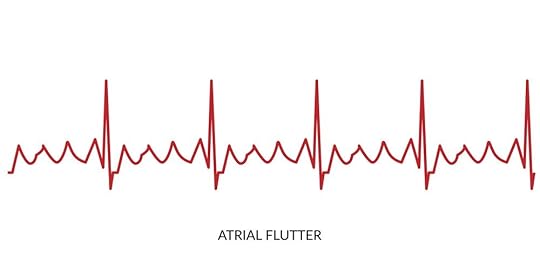
Atrial flutter. Photo copyright mattbadal in DepositPhotos
So, yes, I was at the hospital from 1:15 to nearly 8:00. A very long day, with only a few sips of water and nothing to eat since a small lunch. I was exhausted when I got home, but my heart and blood pressure were back to normal.
The next day, I got a phone call telling me I was booked for an echocardiogram and a stress test on the following Monday.
The day after that, my oncologist's nurse phoned to make sure I was okay and that I was being looked after.
Tests and ResultsMonday at 1:00, Les dropped me off at the hospital and I headed to the Central Waiting Room. I waited about half an hour and then a nice young man who looked to be in his mid-twenties came to get me for the echocardiogram. For some reason, we ended up talking about experiences with physiotherapists before he started telling me when to breathe and when to hold my breath so he could take a picture.
When that was done, a slightly older woman (thirties maybe) came to get me for the stress test. Since I'd had one before, I'd come prepared with shorts and a light top under my flannel shirt and sweatpants. She took readings, then connected me and the blood pressure cuff to the treadmill, and started it. Every few minutes, she increased the speed and the angle until my heart rate finally reached 147, which was the goal. She took my blood pressure during and after the test. Then I was free to go. My heartbeat was fast, but this time it had a reason to be. And it slowed down as I walked to the entrance to the hospital.
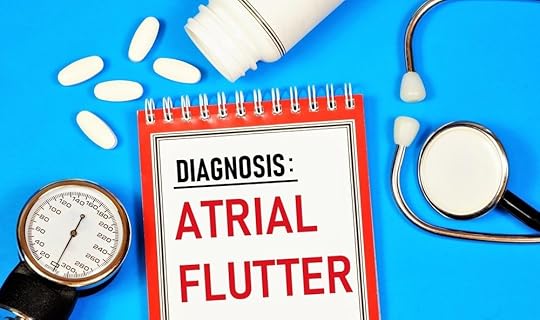
Photo copyright nik93737 in DepositPhotos
The next day, a cardiologist phoned to tell me I did have atrial flutter. (Not fibrillation, which is similar but a bit more serious).
He gave me a prescription for a beta-blocker and blood thinner until he could schedule an ablation with a specialist to fix it. Hopefully in around 3 months when they can do elective surgeries again.
(Note: Les had a "flutter” nearly two years ago, although his was somewhat different. The same cardiologist saw him and they did an ablation on him 18 months ago! It fixed his problem.)
The good news is the medicines the cardiologist has given me should keep me from getting a blood clot and keep my heart from speeding up too fast, either of which can lead to a stroke. I've been taking both of them for a week and there haven't been any problems.
Naturally, the main side effect of the medications will be fatigue, but that won’t be new. In fact, it’s entirely possible that the fatigue I’ve been blaming on the chemo and zoledronic acid was actually coming from my heart, so I might even feel less fatigue!
I'm scheduled to have the second zoledronic acid on May 4th. We'll see how it goes this time.
So What Happened?I have no idea what caused my heart to start going so fast. Was it because of the appointment mix-up? My concern about having another bout of fatigue after the zoledronic acid? My phone battery's being so low? A combination of all three? Or did it just happen out of the blue? All I know is the timing was absolutely perfect and my oncologist and his nurse did everything right!
The bottom line is that because my heart started pounding while a doctor was actually listening to it with his stethoscope, and because he immediately sent me to get an ECG, they caught the flutter! I have no idea how long I've had it. At least 6 or 7 years. Possibly longer. And I could have had a stroke at any time without warning.
Lots more info about atrial flutter at: https://www.cedars-sinai.org/health-library/diseases-and-conditions/a/atrial-flutter-1.html
The post A Routine Medical Appointment Turns Scary appeared first on N. J. Lindquist.
A Routine Appointment Turns Scary
As I write this, it’s been 2 1/2 years since I had breast cancer surgery. And on May 22nd, it will be two years since I finished both the chemo and radiation I was given after my cancer turned out to be the triple negative variety. (I have other blogs where I talk about my journey and the side effects.)
Roughly a year after I finished the chemo, I was just beginning to feel more energy and more “brain.” I went back to writing my LoveChild blogs, started to think about working on a book, and even did some marketing.
By July, 2020, in spite of the pandemic, I was feeling almost normal. I'd even finished and published a middle grade fantasy.
However, on August 16, 2020, I had the first of what were planned to be six injections of zoledronic acid—a drug that helps prevent bone cancer and also treats osteoporosis (which chemo can cause or make worse). Immediately after the injection, I went back to having very low energy and very little brain.
When I say "low energy," I mean that at any given moment, while I could think of 20 things I really wanted to do and should do, most of the time, I'd reject them all in favour of reading another light mystery novel on my Kindle. And no, it didn't have to be a good novel.
Since then, I’ve been gradually getting a little more energy, but still not much. So I was very reluctant to get the second zoledronic acid injection in February when it was scheduled.
As it turned out, Covid pushed my appointment into May, and I can’t say I was sorry. Which brings me to this month.
Routine Blood TestOn Monday, April 12, I had an appointment at the hospital cancer unit at 1:30 to have some blood tests done. That's standard for getting chemo or zoledronic acid. Normally, you have the blood test, see the oncologist an hour later, and if everything's good, have the treatment after that.
However, back in February, when I got the phone call delaying the appointment, I was told that the blood test would be on Monday and I'd see the oncologist and get the zoledronic acid the following day.
This was new, so I questioned the times, and read what I'd written down, and was told I’d written the times down correctly. So I just assumed that because of the pandemic, they didn’t want people hanging around the hospital for an hour. Since we live about a ten-minute walk from the hospital, it was no problem either way.
That Monday was a somewhat rainy and chilly day, so Les dropped me off at the hospital and drove off to park a couple of blocks away and walk in the area. (Since he hasn't been able to swim for the last year, he's been forced to walk every day instead.) We expected me to be there only a few minutes, so he'd be handy to pick me up when I was done.
When I checked in at 1:15, they told me I’d have the blood test right there (instead of in the usual outpatient lab) and I’d see my oncologist at 2:15.
I said, “But my appointment with the oncologist is tomorrow at 1:30.”
“No, you’re having the zoledronic acid tomorrow at 1:30, but you’ll see the oncologist today.”
It was clear they thought I’d made a mistake, but I was just as certain that I hadn’t. I always write down my appointments in Trello, an app on my phone, and then I read back what I’ve written to make sure it's right. I remember doing it this time because it was different. It wasn’t a problem, but I did feel a bit annoyed that they thought I’d made a mistake when I was certain I hadn't.
The other annoying thing was that I’d been going to spend some time that afternoon talking to Les about the zoledronic acid pros and cons, and writing down what I wanted to ask the oncologist. The bottom line was that I really didn’t want to go back to the extreme tiredness and brain fog I'd had after the first injection. I was just beginning to feel somewhat “normal.” But at least I’d have half an hour or so before the appointment to text Les and marshall my thoughts.
Oops! After I sat down to wait for the nurse to come and get me to take my blood, I sent Les a quick text to let him know I'd be seeing the doctor, and noticed that my phone was down to 14%. Still lots of battery to let Les know when I was ready to go home, but not great if I wanted to talk to him before I saw the oncologist.
A nurse came to get me for the blood work. A few minutes later, I was just going back to sit down in the waiting room when a second nurse, who looked about my granddaughters' age, called me and took me into one of the appointment rooms my oncologist uses.
Okay, that was quick. I wasn't going to have time to talk to Les or even do much thinking.
High Blood Pressure?The nurse gave me a gown, and came back as soon as I’d changed. She asked how I was doing and took my blood pressure. It was 167, which is higher than normal. She asked me if I was under a lot of stress.
I wasn’t sure what to say. ”Not until I got here?” But, honestly, I rarely ever get stressed. If the milk spills, I clean it up. I don't have high blood pressure, and I wasn't really stressed, was I? I mean, there'd been a small mix-up, but it really wasn't that big a big deal. At the same time, the inside of my head felt kind of hot and I seemed to have difficulty figuring out what to say.
When the nurse went out, I had time to text Les about what was happening, but as I went to do it, I noticed that my phone had jumped down to only 4%! Not a problem if he’d been at home, but he was walking nearby and I have to confess, I don’t know his cell number if I had to call from another phone. I texted "in," then shut my phone and sat there trying to remember what I needed to ask the oncologist.
However, my oncologist came in and immediately threw me a curve. If I was anxious (presumably because of my elevated blood pressure?) about having zoledronic acid, I didn’t need to have it. The percentage it helps is only 2-4% and my cancer was caught very early. Then he mentioned a new study that was looking at whether just one injection might be enough.
But I'd been scheduled to have six! That was the normal treatment for triple negative cancer.
Okay, so what should I do? There was also osteoporosis. I had been borderline before the chemo so it was likely worse. Zoledronic acid helps with that.
I felt confused, my head seemed to be hot, and I didn't know what to say…
Then he suggested he give me a quick check-up.

Photo copyright sripfoto in DepositPhotos
First thing was the stethoscope. He had me lay back, and I suddenly realized I could feel my heart beating really fast. Neither of us spoke. He had me sit up straight so he could listen from the back. My heart was now pounding like a jack hammer. I wanted to say, “Do you hear what I hear?” But that was crazy. It must be thundering in this ear.
The next minute he was telling me that my heart was going too fast and there was a chance I could have a stroke. He asked if I was able to get dressed and walk down the hall to the outpatient lab to get an ECG (electrocardiogram).
I said I could. It was already slowing somewhat.
I told him I'd had something similar about 6 or 7 years ago. Highish blood pressure, heart very fast.
That time, I was at home, and I got Les to drive me to Emergency. They did an ECG, blood tests, and an X-ray, and referred me to a cardiologist who had them do an echocardiogram, a stress test, and a Holter monitor.
They didn’t find any problems then, so I felt fairly confident that there would be no problems this time, too.
I texted Les to tell him I was going to get an ECG and that he needed to go home because my battery was now at 1%! I said I'd have a nurse call him when I was done. Then the nurse, who seemed as concerned as my oncologist, walked me the short distance down a hallway and left me at the entrance to the outpatient lab.
After the ECG, I went back to the cancer clinic and, after a short wait, saw my oncologist again. He said that based on the ECG results, he’d spoken with a cardiologist and I was to go straight to Emergency.
The nurse got me to sit in the hallway while we waited for a porter to bring a wheelchair and take me there. (Emergency is on the opposite side of the hospital and up one level).
I was surprised to see I still had 1% battery on my phone, so I texted Les to tell him I was going to Emergency and someone would call him when he could pick me up. (Yes, he was going a bit crazy at home because all he knew was that something was wrong and my oncologist had sent me to Emergency!)
There was a short wait for the porter, but he finally arrived and took me on a long journey through the hospital to Emergency.
My Visit to EmergencyWhen we got there, I realized that I was standing right in front of the front doors in the triage line. Hmm. Since I still had 1% battery (!), I quickly texted Les. "Meet me at Emergency and switch phones. Bring my water bottle.” At least now we'd be able to keep in touch!
No one was allowed to accompany a patient inside Emergency without permission, but when Les arrived, I was able to reach through the door to exchange phones, grab my water bottle, and assure him I felt fine.
After a long wait, standing six feet from the other people in the waiting line, I saw the triage nurse. By then, my heartbeat was pretty close to normal, but my blood pressure was still a bit high. The waiting room was all socially distanced, with a range of people from a sleeping infant to an elderly lady in a wheel chair.
I sat in the waiting room for what seemed like ages, but was likely half an hour. At least I could text with Les and use his phone to check on the news.
Eventually, they did another ECG and took blood for new tests.
Then another long wait in a new area until I saw a young nurse practitioner who examined me and then checked with a doctor who asked her to send me to get an X-ray. Then more waiting.
At about 7:45, when I finally saw the cardiologist who was on duty, he said that my heart and blood test results looked good, and my second ECG was normal, but because the first ECG had caught a "flutter,” they would be scheduling more tests.

Atrial flutter. Photo copyright mattbadal in DepositPhotos
So, yes, I was at the hospital from 1:15 to nearly 8:00. A very long day, with only a few sips of water and nothing to eat since a small lunch. I was exhausted when I got home, but my heart and blood pressure were back to normal.
The next day, I got a phone call telling me I was booked for an echocardiogram and a stress test on the following Monday.
The day after that, my oncologist's nurse phoned to make sure I was okay and that I was being looked after.
Tests and ResultsMonday at 1:00, Les dropped me off at the hospital and I headed to the Central Waiting Room. I waited about half an hour and then a nice young man who looked to be in his mid-twenties came to get me for the echocardiogram. For some reason, we ended up talking about experiences with physiotherapists before he started telling me when to breathe and when to hold my breath so he could take a picture.
When that was done, a slightly older woman (thirties maybe) came to get me for the stress test. Since I'd had one before, I'd come prepared with shorts and a light top under my flannel shirt and sweatpants. She took readings, then connected me and the blood pressure cuff to the treadmill, and started it. Every few minutes, she increased the speed and the angle until my heart rate finally reached 147, which was the goal. She took my blood pressure during and after the test. Then I was free to go. My heartbeat was fast, but this time it had a reason to be. And it slowed down as I walked to the entrance to the hospital.

Photo copyright nik93737 in DepositPhotos
The next day, a cardiologist phoned to tell me I did have atrial flutter. (Not fibrillation, which is similar but a bit more serious).
He gave me a prescription for a beta-blocker and blood thinner until he could schedule an ablation with a specialist to fix it. Hopefully in around 3 months when they can do elective surgeries again.
(Note: Les had a "flutter” nearly two years ago, although his was somewhat different. The same cardiologist saw him and they did an ablation on him 18 months ago! It fixed his problem.)
The good news is the medicines the cardiologist has given me should keep me from getting a blood clot and keep my heart from speeding up too fast, either of which can lead to a stroke. I've been taking both of them for a week and there haven't been any problems.
Naturally, the main side effect of the medications will be fatigue, but that won’t be new. In fact, it’s entirely possible that the fatigue I’ve been blaming on the chemo and zoledronic acid was actually coming from my heart, so I might even feel less fatigue!
I'm scheduled to have the second zoledronic acid on May 4th. We'll see how it goes this time.
So What Happened?I have no idea what caused my heart to start going so fast. Was it because of the appointment mix-up? My concern about having another bout of fatigue after the zoledronic acid? My phone battery's being so low? A combination of all three? Or did it just happen out of the blue? All I know is the timing was absolutely perfect and my oncologist and his nurse did everything right!
The bottom line is that because my heart started pounding while a doctor was actually listening to it with his stethoscope, and because he immediately sent me to get an ECG, they caught the flutter! I have no idea how long I've had it. At least 6 or 7 years. Possibly longer. And I could have had a stroke at any time without warning.
Lots more info about atrial flutter at: https://www.cedars-sinai.org/health-library/diseases-and-conditions/a/atrial-flutter-1.html
The post A Routine Appointment Turns Scary appeared first on N. J. Lindquist.
January 7, 2021
The 10 Best Non-fiction Books I Read in 2020
1. Hiding in Plain Sight: The Invention of Donald Trump and the Erosion of America by Sarah Kendzior
I’ve followed Sarah on Twitter for several years, and while I agree with what she says, I was almost fearful of reading her book. Sometimes you’d rather not know how bad it is.
She begins by referencing Orwell’s book 1984 before going into a big picture history lesson that helps readers understand what’s been going on in the world since the Cold War between the West and the USSR that began in 1947 ended in 1991.
That leads to the repercussions of the ending of the Cold War, which ended up with not only President Trump and a divided America, but also with militant far right Conservative groups in Canada and several European countries.
Why does every thinking person need to read this book? Because there are deep currents underlying what we see happening - like the proverbial ice berg - and the craziness and anger aren’t going to just go nicely away.
Sarah also has a podcast which she uses to keep her information up-to-date.
https://www.goodreads.com/book/show/52274929-hiding-in-plain-sight
2.
Begin Again: James Baldwin's America and Its Urgent Lessons for Our Own by Eddie S. Glaude Jr.
A hard-hitting, yet beautifully written book that takes the reader into the world of Black author James Baldwin, and helps us understand the reality of being a Black people living in a country that belongs just as much to them as it does to the white people who all too often treat people of colour as second class or worse. The book also shows parallels between the civil rights struggles of the mid-20th century and today.
https://www.goodreads.com/book/show/45754985-begin-again
3. Bushrunner: The Adventures of Pierre-Esprit Radisson by Mark Bourrie
We were taught about the brave explorers Radisson and Groseilliers when I was in grade school, but we only had names, dates, and areas where they travelled. This book, which is based on Radisson’s journals, not only brings the man to life (and what a life it was!) but also lifts the curtain on early life in Canada and the northern States of the US, First Nation villages, and even to England during the Great Plague. Highly Recommended.
https://www.goodreads.com/en/book/show/44639211-bush-runner
4. Too Much and Never Enough: How My Family Created the World’s Most Dangerous Man by Mary L. Trump
A book written by President Trump’s niece. It offers the best insight I’ve found into Trump’s life with his parents and siblings, and shows clearly what led to his becoming the person he is.
https://www.goodreads.com/book/show/54114950-too-much-and-never-enough
5. White Fragility: Why It’s So Hard for White People to Talk About Racism by Robin J. DiAngelo and Michael Eric Dyson
For any white people who can't accept that they might be racist, or don't understand what systemic racism is, this is the book to read. A white person explains to white people how easy it is to be racist without knowing you are.
https://www.goodreads.com/book/show/43708708-white-fragility
6. No Time Like The Future: An Optimist Considers Mortality by Michael J. Fox
Like others who loved Michael on Family Ties, Back to the Future, and other shows, I've followed his struggles with early onset Parkinson's disease with a heavy heart. It was terrible to see such an amazing actor cut down in his prime.
Yet Michael has become a key spokesperson, not only for people who have this disease but for anyone struggling with negative things in their life. This, his third book is just as inspiring as the first two.
https://www.goodreads.com/book/show/50403451-no-time-like-the-future
7. A Higher Loyalty: Truth, Lies, and Leadership by James Comey
Honestly, I wasn’t sure I wanted to read this book, or what I thought of Mr. Comey, but I’m glad I did because now I have a much better idea of how the FBI works, or at least worked in the past. But what put the book at another level was the way Comey's personal story was woven into his perspective on his job. I have far more respect for Comey than I did before, even though I’m still not sure I trust him.
https://www.goodreads.com/book/show/35108805-a-higher-loyalty
8. Compromised: Counterintelligence and the Threat of Donald J. Trump by Peter Strzok
I found this book a great companion to Comey’s. While Comey was at the highest level in the FBI, Strzok was in the field, so there’s a different, also quite enlightening, perspective. I found it worth reading.
https://www.goodreads.com/book/show/54114318-compromised
9. Separated: Inside an American Tragedy by Joseph Soboroff
Soboroff is someone we need many more of - an investigative reporter looking for the truth about the families who were separated by President's Trump’s horrendous policies at the southern border. Soboroff details his efforts to find out what was going on and what he discovered.
https://www.goodreads.com/en/book/show/49604006-separated
10. Empty the Pews: Stories of leaving the Church by Chrissy Stoop and Lauren O’Neal
I found this collection of 21 stories of people who had left fundamentalist Christian churches quite sad, but also enlightening. It was helpful for me to understand why some individuals turn away from God and the church. No question, there were very good reasons for leaving.
Unfortunately, too many churches and families see Christianity as a set of rules they use as a bludgeon to force others to behave as they think it proper. What appears to be lacking are love and empathy.
https://www.goodreads.com/book/show/49604103-empty-the-pews
The post The 10 Best Non-fiction Books I Read in 2020 appeared first on N. J. Lindquist.
July 20, 2020
A Robins’ Nest at Our Front Door, Part 5
If you missed the earlier posts, click here to find them.
August 1st and 2nd:
I will try to show you the slice of life I saw being enacted at my front door. (No, I didn't watch them all day long, but I did keep checking on them.)
When I first looked out, Papa Robin was sitting on the post at the left side of our front steps. It was rare for me to see an adult bird there.
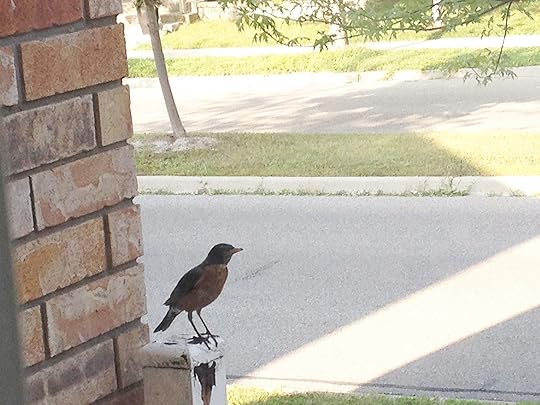
Mama Robin was in the tree in front of our house. It's a bit blurry. I think she started to fly off as I snapped it. They were always moving for some reason or another. A person coming by, a car, a dog barking, a squirrel, any noise...

The two baby birds were in their nest above our front light. (Not a great picture because I was standing on the step stool, peering up at an angle, but you should be able to see two watchful little heads.)
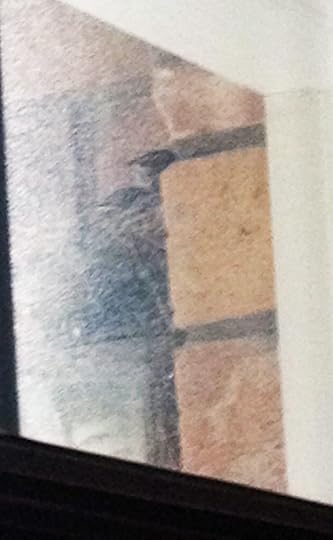
For two days, the adult birds took turns chirping quite loudly. The little ones were chirping, too, but it was more like plaintive cries while the parents chirps were demanding. This is what I thought they were saying:
Papa bird: You will fly today. Really you will.
Baby birds: Not a chance.
Papa bird: You want to eat today?
Baby birds: You’re joking, right?
Mama bird: We’re not joking.
Baby birds: But we’re starving. You’re terrible parents!
Mama Bird: No, we aren’t. You’re too big to stay in the nest.
Baby birds: Please. If you feed us, we’ll be stronger.
The adult robins called and called for the baby birds to come to them, but to no avail.
The next time I looked out, one of the adults was across the street, still chirping loudly. He or she slowly walked across the road toward our house and the nest, chirping the entire time.
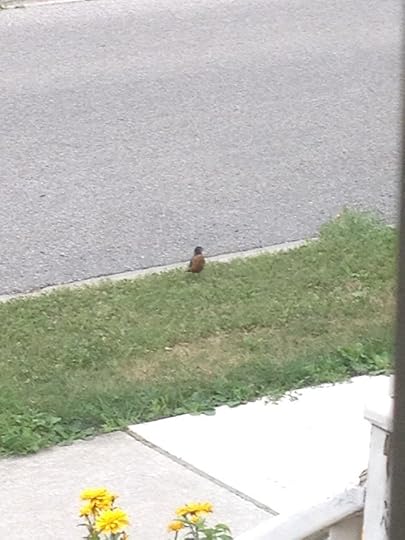
Mama Bird coming up the steps, pleading.

Papa Bird on the post where Mama Bird usually sat.
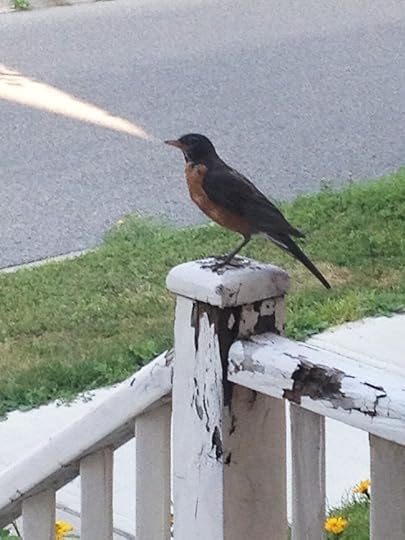
Papa Bird not moving even though a person was coming toward our house. Very brave of Papa Robin to stand his ground, although he did fly off at the last minute, presumably as a distraction. No people were injured, although it's possible something white may have landed on the person's car.
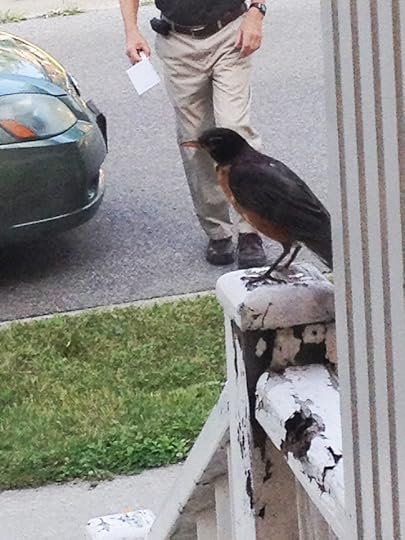
Heart-broken Baby Bird is SO VERY HUNGRY.
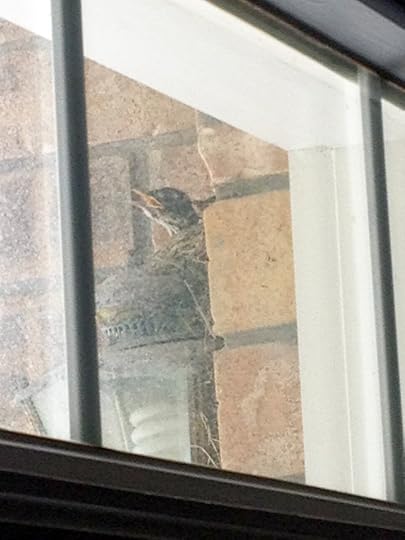
Papa Bird in the tree out front. I think he was holding a worm.
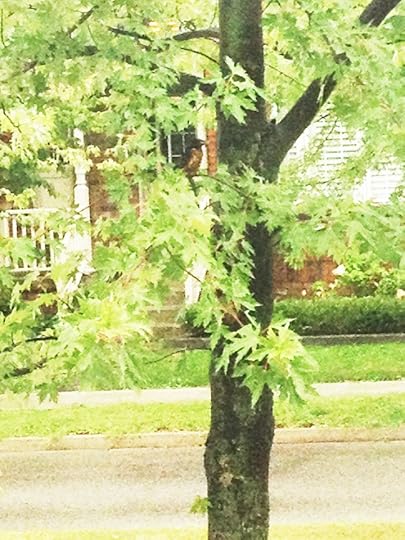
Baby Birds: We're going to die here unless you feed us!
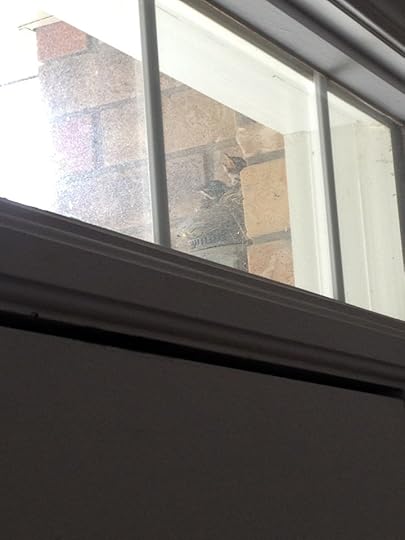
Mama Bird: Just jump out of the nest. I promise you'll be okay!
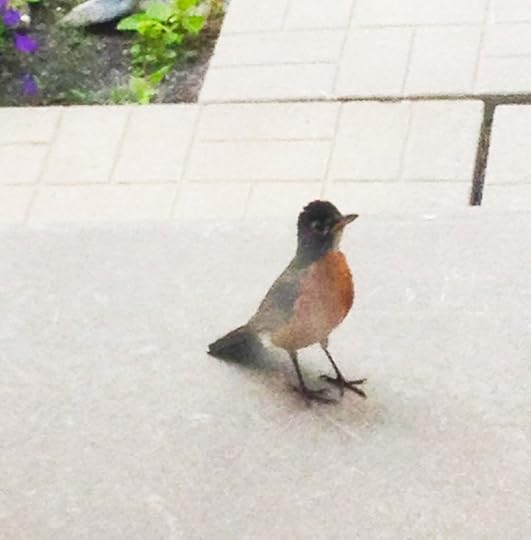
Baby Birds: You're so mean! We're starving to death.
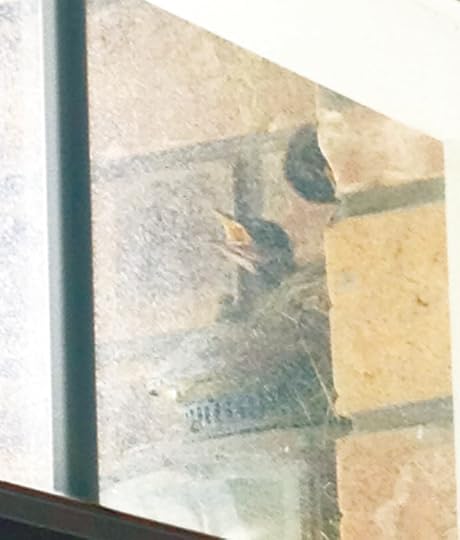
Mama Bird back on the post, and going up the handrail to get closer to the nest. She chirped loudly ever few seconds.
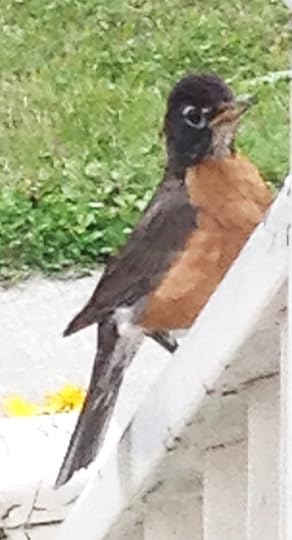
Eventually, the parents did feed both the baby birds because, of course, they needed the food to help them get stronger. But the way Mama Bird looked at me says it all. "I know I gave in. You have to once in a while. Do you think you could have done any better?"
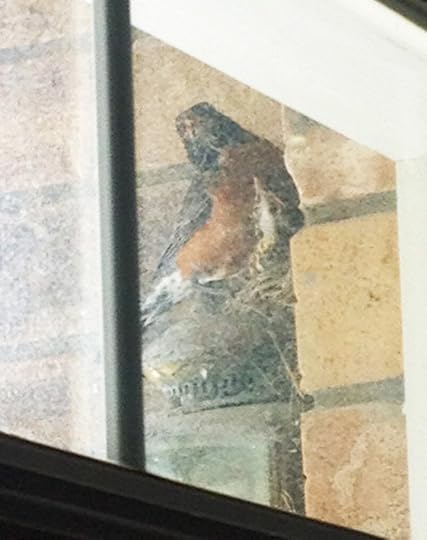
It took whole two days for Papa and Mama Bird to convince the first baby bird (presumably the one that hatched first) to take a chance on leaping from the nest. My guess is that it flew out early in the morning of August 3rd, before I was up.
All I know for sure is that when I came downstairs that morning and looked out, only one baby bird was in the nest. One very stubborn baby bird.
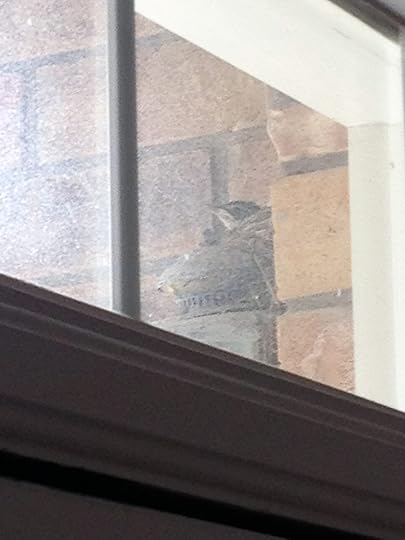
To Be Continued...
The post A Robins’ Nest at Our Front Door, Part 5 appeared first on N. J. Lindquist.
July 9, 2020
LoveChild 38: Memories of Aunt Margaret and Uncle Albert
“My forebears played a significant part in making me who I am. I honor their legacy. I will never forget what they gave me. I will love them until the day I die. ”
― Laurence Overmire, Digging for Ancestral Gold: The Fun and Easy Way to Get Started on Your Genealogy Quest
Memories of My Aunt and Uncle
If you missed the post before this one, you might want to read it first.
Because Granny Shaw was 75 when I was born, she was actually more like a great-grandmother than a typical grandmother. Which meant that my dad's sister and brother-in-law, who had no children of their own and lived with Granny Shaw, were more like my grandparents rather than my aunt and uncle.
Aunt Margaret turned 14 in December of 1911. My dad was born in February of 1912. So, when I was six, Aunt Margaret and Uncle Albert were both 56, which is a reasonable age for grandparents.
I’ve mentioned before that Granny Shaw had bought the house on 12th street in Brandon after she was widowed, and that not only my dad and his younger sister Jean lived there, but also their older sister Margaret and her husband Albert.
Aunt Jean and my dad left after they were married, but Aunt Margaret and Uncle Albert continued to live with Granny Shaw.
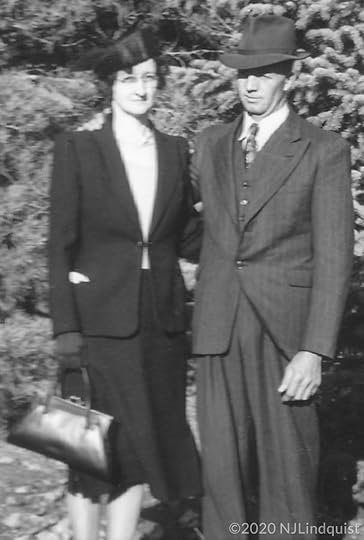
Aunt Margaret and Uncle Albert would have been in their early forties here.
I have only a handful of pictures of Margaret and Albert Roney, but although most of the pictures were taken before I was born, neither of them changed much at all. Of course, they aged, but aside from added wrinkles, they looked and dressed pretty much the same.
Sadly, I don't have a single picture of either of them with me.
My parents took very few pictures and all they had was their old box camera. And I don't think Aunt Margaret and Uncle Albert even had a camera.
Really, no one I knew thought of taking a picture back then except for special occasions.
Their AreaI've mentioned before that Granny Shaw, my dad's mother, occupied the room at the front of the house. Uncle Margaret and Uncle Albert shared a small bedroom at the very back of the house, behind the kitchen. I believe it was an added-on area.
In their bedroom, they managed to squeeze in a three-quarter bed (48"x75"), an old bureau, and a single wooden chair belonging to the small kitchen set. The closet was small, but even so, there was room to spare in it.
Next to the bedroom was a small powder room that Granny Shaw and visitors also used. To have a bath, they'd need to go upstairs to the only full bathroom. Since the upstairs rooms were rented out for small amounts to boarders (often people in need), that was the bathroom they used, too.
I believe the floors in the hallway and two main rooms on the main floor were hardwood, but the kitchen and their bedroom had worn linoleum, and it kind of gave a bit as you walked on it. I always felt that I was going downhill when I walked from the hallway through the kitchen, but I have no idea whether that was accurate or not.
When you entered the kitchen from the front hallway, there was a stove immediately to your right. It was the most interesting thing in the house as far as I was concerned. We had an electric stove, as did everyone else we knew. But this was a large wood-burning stove. Uncle Albert had to bring in wood from a pile in the back yard to keep it burning. The idea of having an actual campfire burning inside your house, and using it to cook your food, was always fascinating to me. I'm pretty sure I roasted marshmallows at it more than once.
Beyond the stove were white or pale grey cupboards, with a sink below the window in the middle of the cupboards.
At the end of the cupboards, on the wall at the back of the house, was a small white fridge. Next to it, there were three doors. The first opened up to a tiny back hall that led to the door to the back yard. The second door was to the powder room, and the third led to Aunt Margaret and Uncle Albert's bedroom. It was often left open.
Against the wall alongside the bedroom, and straight ahead when you came in from the hallway, was a small wooden table, with three chairs. It might have looked something like the one below, which has an enamel top.
I found this table for sale on a website, which is linked here.
The Living/Dining RoomThe room between Granny Shaw's room and the kitchen was the dining room/living room. I remember that room so vividly I can't believe I don't have a picture of it. A dining room table was in the centre of the room. The chairs were either pushed in if there was a meal coming, or arranged wherever possible along the walls if there was to be company.
On one side of the table were a chesterfield and a piano; on the other side there was a buffet that held the good dishes and tablecloths and the chair that went with the chesterfield. There was a small bay window at the end of the room. On one side of the window was a small glass china cabinet that held keepsakes and ornaments. The other side of the buffet had a dining table chair that had arm rests. Any remaining open space was taken up with odd tables, chairs, etc.
It was always crowded in that room, no matter how many people were in it. And there were often quite a few people. On either side of the table there was just barely room to get by, and moving in either direction became tricky when people were seated or when the piano bench was out.
Uncle Albert had made two more leaves in addition to the four small ones that had come with the wood table so that more people could fit, and both the piano bench and the chairs from the small kitchen table and Granny Shaw's chair were often used for additional seating. When there were more than six or eight people at the table, only Aunt Margaret or Uncle Albert, who always sat at the end next to the doorway, could get out to bring more food, etc.
I do have some pictures of the table and buffet and the china cabinet. For more than thirty years, I owned all three. My dad shipped them to us when Aunt Margaret moved into a seniors' residence just as we were moving into our first house. They travelled from Brandon to Regina, and then to Mississauga, Calgary, and Markham. Not only were they used a great deal by Granny Shaw and the Roneys, but they were-well used by our family, too. I still have the china cabinet.
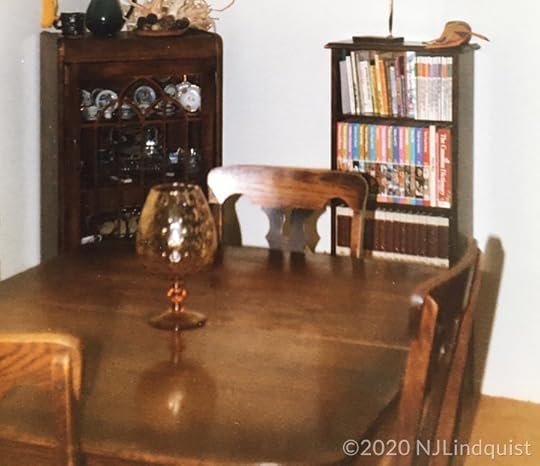
The table and chairs, and the china cabinet, which is a bit dark here, but has a glass front.
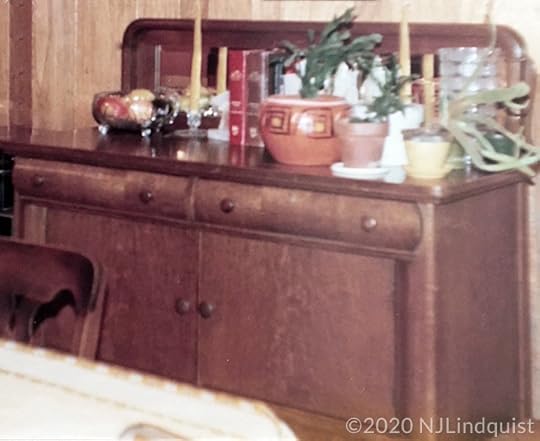
The buffet. No, they weren't a matching set, but they did have a very similar colour. The table wasn't that brown and the buffet wasn't this reddish. Different houses and different lighting.
Aunt Margaret
Ida Margaret
Roney was a thin woman, a bit taller than my mother. She typically wore long straight skirts with blouses and cardigan sweaters, sensible shoes, and thick beige stockings. Like her mother, she always wore her hair pulled back in a tight sort of roll and often had a hair net covering it. She wore thin wire-framed glasses and no make-up.
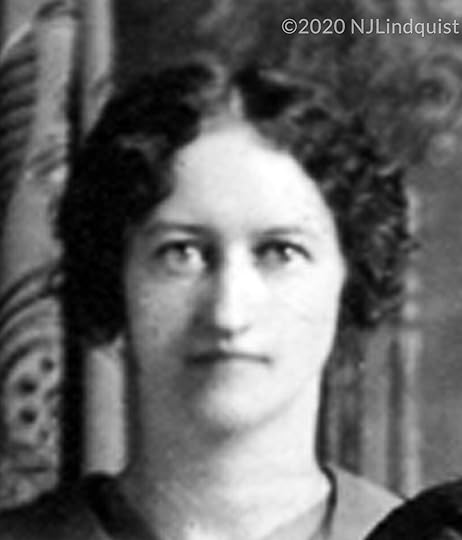
This was cropped from a family picture. Margaret would have been 20 or 21 here.
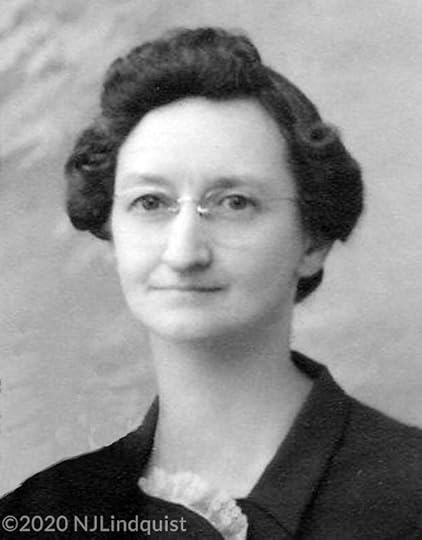
This was also cropped from a family picture. She'd have been in her early 40s, I believe.
Uncle Albert
Albert Thomas Roney was born on July 5, 1899, in Mitchell, Perth County, Ontario. He was the son of Robert Roney and Ida Jane Vipond. I assume he went to Manitoba, like so many others, in order to homestead.
Albert was a a little taller than his wife, and always quite thin. I remember him as wearing shirts with coat sweaters that had frayed elbows. Although his grey pants had worn knees, they were always clean and pressed.
His hair was an indeterminate shade of brown, and it grew more sparse with each year. His face had never been handsome, and as he grew older, it simply wrinkled here and there and the skin grew more faded and more worn. It was a face one would never notice in a crowd. I also recall he had a slight stoop to his shoulders, as though he had been carrying a heavy pack for too long. Unfortunately, I have no photos of him when he was younger. These are the best close-ups, I have.
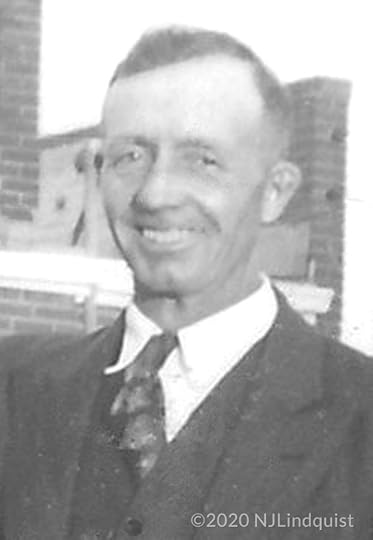
This was cropped from a picture taken October 12, 1941.
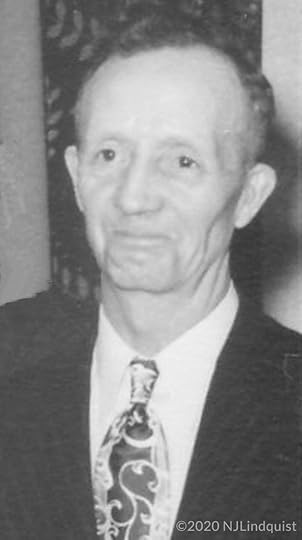
This was cropped from a picture of the "inlaws" from 1955. He'd have been 56.
Reflections
Most of the photos I've used here were taken on October 14, 1941. My guess is that Margaret and Albert had taken a holiday and driven to Indian Head to see Bob and Margaret. Aunt Margaret and Uncle Albert would have both been 42, and my dad (Bob) and my mom (Margaret) would have been 29 and 30.
To be perfectly honest, these pictures perfectly illustrate something that bothered me a lot when I was young. I frequently looked first at Aunt Margaret and then at my mother, who had the same name, and wondered how two such different women could inhabit the same world. In these pictures, both Margarets are dressed alike, with suits, blouses, hats, gloves, shoes, etc., but, to me at least, Aunt Margaret managed to look at least 20 years older than her age.
Uncle Albert also looks a bit older than he really was, although the styles for men's clothes back then didn't really suit any of them.
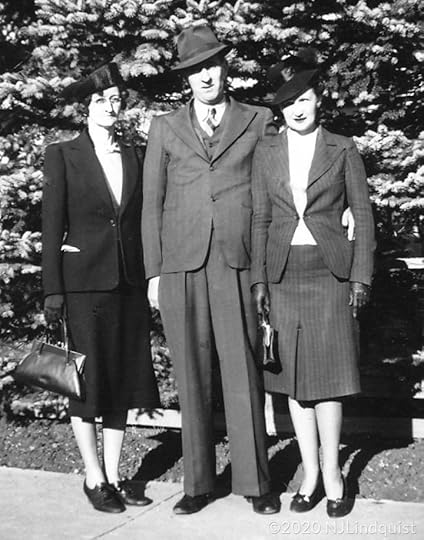
Aunt Margaret, Dad (Bob), and Margaret (Mom).
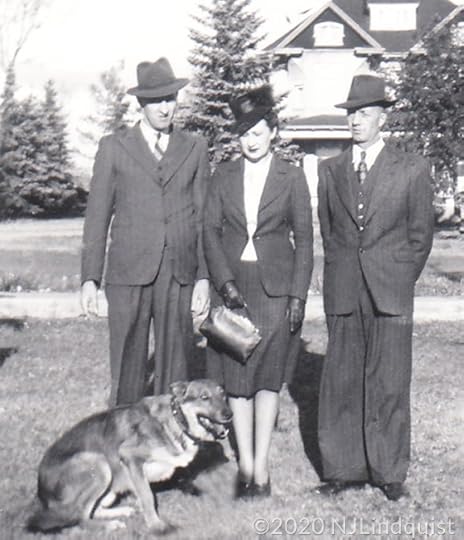
Dad, Mom, and Uncle Albert. Plus Bozo.
Their Lives
Uncle Albert and Aunt Margaret had moved in with Granny Shaw after losing their farm during the Depression. Thereafter, he worked as a mechanic for a while. When I was old enough to notice, he worked in a cold storage locker plant. Six days a week, including Saturday mornings, Uncle Albert went off to rent lockers to people, help carry heavy packages, and aggravate the bronchitis that plagued him for many years. I vaguely remember my dad's taking me there once so I could see the lockers.
Meanwhile, Aunt Margaret looked after the house and the boarders and washing clothes, etc. She also did most of the cooking, although Granny Shaw still contributed as she was able.
What their married life was like I couldn’t say. I never heard why they had no children. Perhaps they didn’t know themselves.
If they ever argued, I never saw a sign. Rather, my uncle did whatever he was asked by either my aunt or his mother-in-law. I know he sometimes disagreed with them, but I never once heard him raise his voice or make demands.
Uncle Albert was a simple man. I don't know how much education he had. Probably not a lot. He was soft-spoken and shy, rarely taking part in discussions on politics or finances. I never heard him complain even though he no doubt had many causes for complaint.
He was the kind of man who would never be noticed in a crowd. A man who might easily be passed by. But when I was six, aside from my parents, he was my favourite person.
Our Games
Whenever we visited Brandon, usually on Sunday afternoons, while my parents talked to Granny Shaw and any other relatives who dropped in, and Aunt Margaret fussed over making tea and getting meals ready and such, Uncle Albert would play games with me.
They had a wooden Chinese checker board with marbles. Before I was old enough to understand the actual games, we played a different game. We called it “Count the birdies.” He would pick up some of the marbles in both hands and shake them. Then I would try to guess how many marbles he was holding. When I guessed wrong, his eyes would sparkle and the gold fillings in his teeth would glint as his face broke out in a smile. When I guessed right, he would smile and open his hand to let me count them. Of course, I made him guess, too, trying to hold as many marbles as possible in my much smaller hands.
We didn’t say much, and as I got older and we started playing Chinese checkers for real, I had to make sure I let him win half the time. He always seemed to be having as much fun as I was.
Every time we visited, one of us would get out the checker board, and we would sit beside each other on the worn couch, or on two chairs if the couch had been taken, and we would play.
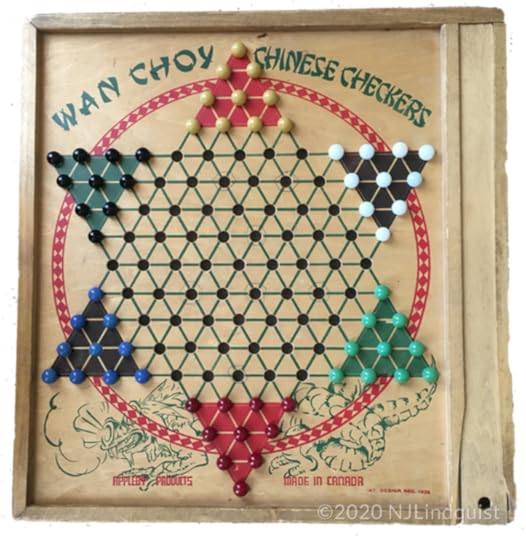
You knew I'd still have the checkerboard, right?
Not only that, but in the summer, he would let me help water the vegetable garden out back. I loved to make the water go in waves from the hose (something my dad rarely allowed me to do). And we both loved it when we could see a rainbow in the water. I’m sure the added cost of the water I used was something he could ill afford, but he never minded.
Then my aunt would call him to help her with supper, and he would go. I remember him with a tea towel wrapped around his waist, washing the dishes afterwards. Sometimes I helped. Not enough, though.
Their FaithMy aunt and uncle attended church regularly. She played the piano and sang and she also taught young children in Sunday school. I expect he helped with the cleaning and other odd jobs.
Because Aunt Margaret taught Sunday school, on the top shelf of the closet in her bedroom she kept several large boxes with all kinds of flannelgraph backgrounds and cut-out figures of people and trees and sheep and objects that stuck on the backgrounds in a fashion somewhat similar to Velcro. She used them to tell Bible stories. When I visited, she would sometimes tell me the story she had told that week. Sometimes she even let me play with the flannelgraph figures by myself. (Yes, I still have some of them in a file someplace!)
Aunt Margaret also played the piano, and sometimes she'd take the fold-down lid off the keyboard and she'd show me how to play a few notes. Mom knew how to play "Mary Had a Little Lamb," and I learned to play that.
Sometimes Aunt Margaret would play for everyone. She had several hymn books and some sheet music. I remember that "Jesus Loves Me," "The Old Rugged Cross," "What a Friend we Have in Jesus," and "It Is No Secret What God Can Do" were some of her favourites.
Uncle Albert never said very much about his faith, but he always had a Bible close by, and he always said a short grace before meals.
My parents and I went to church, too, but I always sensed a difference in this house, though I didn’t know what it was.
All I knew for sure was that the three people in that house—Granny Shaw, Aunt Margaret, and Uncle Albert—all loved me. Especially Uncle Albert.
I'm not sure how to explain this, but I was never completely at ease with most people because, for reasons I didn't understand until many years later, I always expected people not to like me, or at some point to tell me I was doing something wrong and correct me. But Uncle Albert always gave me the impression that he was perfectly happy with me exactly the way I was, which was a beautiful gift.
Even today, I tear up when I think about him. No, we weren't related in any way, but I adored that man.
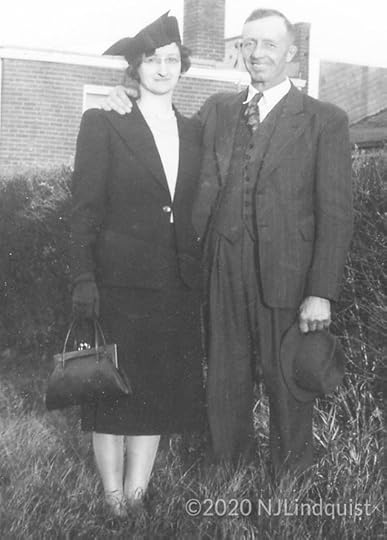
The best picture I have of them, and the only one I have of Uncle Albert as I usually saw him—with a big smile. Aunt Margaret almost always looked like this, too. Either nervous or worried. She did occasionally laugh or smile, but rarely in pictures.
Can you relate?
When you were young, did you have someone who accepted you exactly as you were and never once tried to change you?
LoveChild: Life Lessons from an Ugly Duckling is the story of my struggle to adjust to the life I was given, and my eventual discovery that, not only had I become a swan but, contrary to my perceptions, I had always been one. Though I didn't realize it until many years later, my life was part of a much bigger plan that all made perfect sense.
I'll be blogging my story once a week.
You can find links to all these blogs at:
https://www.njlindquist.com/lovechild/
[image error]Have my new posts sent directly to your inbox.
Sign Up to Have All My New Posts Sent to Your Inbox
The post LoveChild 38: Memories of Aunt Margaret and Uncle Albert appeared first on N. J. Lindquist.
July 1, 2020
LoveChild 37: Granny Shaw Through the Eyes of a Six-Year-Old
"We should all have one person who knows how to bless us...; Grandmother was that person to me."
– Phyllis Theroux
Jennie Shaw, who I called "Granny Shaw," lived in Brandon, as did several of Dad's siblings.
Most of his other siblings lived northwest of Brandon in the Rossburn area.
After we moved to Crystal City, we made the occasional trip to Rossburn, maybe once every two or three years, but we made the trip to Brandon every few months, and I became very comfortable with Granny Shaw, Aunt Margaret, and Uncle Albert.
In a sense, because Granny Shaw turned 80 when I six, in many ways she was more like a great-grandmother. I'd never realized that more clearly than when I was looking for quotations about grandmothers. None of them really applied to her. That was partly because of her age, but also because by the time I came into the family she already had more than 30 other grandchildren, and a good assortment of great-grandchildren.

I’ve mentioned before that Granny Shaw had bought a house on 12th street in Brandon after Grandpa Shaw's death, and that not only my dad and his sister Jean had lived there, but also their sister Margaret and her husband Albert.
Aunt Jean and my dad left after they were married, but Aunt Margaret and Uncle Albert continued to live with Granny Shaw, and they may have owned part of the house for all I know.
Granny ShawGranny Shaw had the front room (with front and side windows) as a sort of bed/sitting room. In her room, she had a single bed, a bureau, a small table with a chair that she could use to write letters or eat at if she wanted to be alone, a rocking chair, a night table next to the bed, and some pictures on the walls.
There are two things I remember most vividly about Granny Shaw's room. One was watching her brush her long hair, which she did every night. I think that's where I first heard about brushing your hair 100 times. Hers was still quite black even when she was in her eighties. She never wore it long. Instead, she put it up in a sort of roll at the back. I think she put it in a net when she slept.
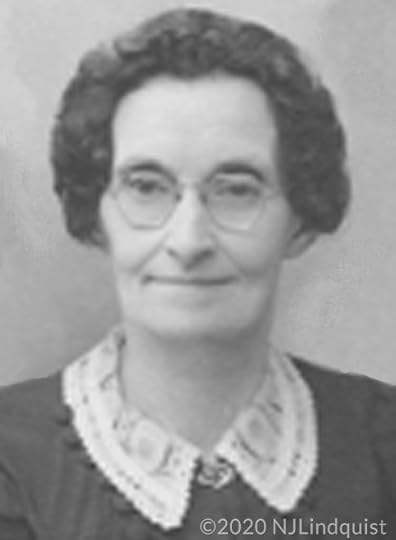
Mary Jane (Jennie Shaw) would have been about 65 in this picture.
If you look at the few pictures I have of her in earlier years, her hair always looked pretty well the same.
The other thing I remember about her room was her letting me play with the little plastic "Bread of Life" container that held small different-coloured cardboard pieces with a Bible verse on each one. She kept it on the lower shelf of the night table next to her bed, and she likely read one each day. I spent hours taking out the cards, reading the verses, and carefully organizing them.
This isn't hers, but the picture is very close to what I remember.
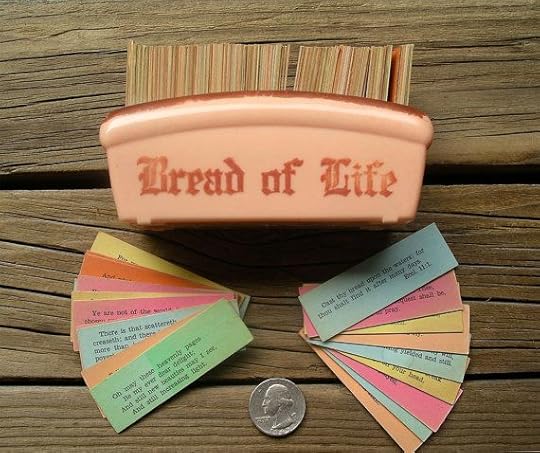
This is very similar to the one my grandmother had. I found it on Pinterest at "The Odd, Old Tried 'N' True Etsy Shop." Click on the picture to go to their shop.
What was Granny Shaw like as a person?If I had to define her appearance, I'd say she always "dressed for success." In other words, she looked business-like, and a little intimidating. Elegant, maybe? Self-possessed. A little 'lady of the house?' Not quite what you might expect from a typical farmer's wife.
She always wore dresses, or possibly a skirt and blouse. When I think about it, I really only remember black dresses. I'm guessing she might have had some coloured ones, maybe even some with patterns, which were called "house" dresses in those days. It's entirely possible she had a good black dress for Sundays or special occasions, which is when we were usually there. She's wearing a black or at least dark dress in every picture that I have of her.
I'm sure she didn't have many clothes, and what she had wear kept clean and mended as necessary.
When she went outdoors, she wore a hat and coat, as you can see in the picture below. Dad is wearing a short-sleeved shirt and she has a coat, a scarf, and gloves on!
You can also get a hint of her size here. My dad was six feet tall and she'd have been a little over five feet.
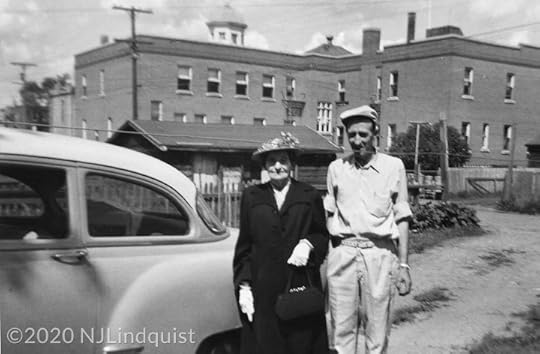
My dad with Granny Shaw. This was taken in the fall of 1954. Not sure where they had been, but the building in the background looks like the back of Brandon Hospital to me. My dad ended up being the person Granny Shaw relied on for a variety of things.
I was never afraid of her, but I think I was always somewhat in awe of her. I don't know how to explain it, but although she wasn't very big, she seemed strong to me. Without raising her voice, she was a forceful woman. Her children referred to her as "Mother," and they rarely argued with her or, if they did, not for long. That doesn't mean they always did what she would have wanted them to do, but they knew better to argue with her.
She could tell my dad she needed him to do something and he'd do it right away (which he didn't always do for me or my mother). And while my mother was about the same size or maybe a little taller, Mom seemed much softer. Maybe that was simply because Granny Shaw was very thin, and she likely had arthritis or other complaints, but I never thought of her as brittle. She certainly didn't make a big deal of any ailments she had.
I'm not sure, but I expect somewhere in my mind I remembered that Granny Shaw had stopped my mother from spanking me in anger that one time, so I felt she could and would protect me if necessary, and never hurt me.
And she had given me books, including Little Women, so that alone meant she had to be high on my list of favourite people!
But she was a serious person. Not the kind you'd joke with, or play games with. She might smile, but I don't recall hearing her laugh. Life was always serious for her. When I think of her being married at 16 and homesteading, and her first baby dying, and raising ten kids while being a farmer's wife, then losing her husband when she still had three young kids, and her sorrow at the loss of her second son, I can understand why she was so serious. She'd spent her lifetime shouldering a lot of responsibilities.
She never wore make-up; nor did most of her daughters. It simply wasn't done in her church. My mother and Aunt Jean did, and they also liked an occasional cigarette. Granny Shaw didn't object to seeing men smoke, but she didn't like to see women do it. So Mom and Aunt Jean would go outside for "a bit of fresh air" if they wanted a cigarette or just wanted to get away for a few minutes to talk to each other. Of course, she knew what they were doing, but I don't recall that she ever said anything. And sometimes I went with them.
Her FaithLike her husband, George Brown Shaw, Jennie Shaw's Christian faith was of the utmost importance to her for her entire life.
I'm quite sure she didn't want my dad to marry my mother, but when he did, she was prepared not only to have them live in her house, but to teach Margaret how to be a good wife.
Maraget was taught to iron dad's shirts as well as the sheets and tea towels. And she was taught how to keep things tidy and—most important—how to cook. For most of her life, almost every every cake or pie or cookie that Mom made came from a recipe box filled with 3x5 cards that Granny Shaw had either written for her or dictated. She also taught Mom how to preserve fruit and make jams and pickles. As for meals, they were basic. Meat and potatoes and a vegetable and salad. That's what men needed. And that's what we had every day for many years.
Now, I have to add that a lot of the attention Granny Shaw gave to educating Mom might have been because she wanted to ensure that Robert was looked after in the way to which he was accustomed.
But there's also this:In those days, a child who had been adopted from strangers was usually illegitimate, and I know that was a negative thing for many people, but I never had any sense of that from her or from any other members of my dad's family, either. In fact, I think she may have felt I needed her even more because of that. Of course, she would also have been aware of how much my parents had wanted to have a child, and that since Mom had had a hysterectomy, adoption was the only possible way.
In any case, even though Mom had told me I was adopted, it never once occurred to me that I didn't really belong, not only to my parents but to my dad's family. And, of course, the person whose opinion would have been been most influential to that family was Granny Shaw.
Speaking of Writing Things Down...When they were married, she gave my parents a large black family Bible. From the pristine shape of the cover and most of the pages, I'm pretty sure neither Mom or Dad ever read it. There were pages in the middle to record their Marriage, Births, and Deaths, and Mom did use it to keep track of family events there.
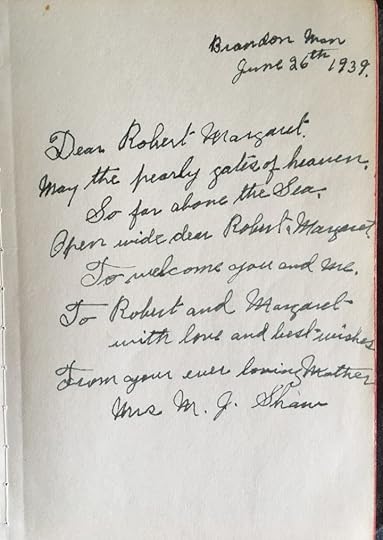
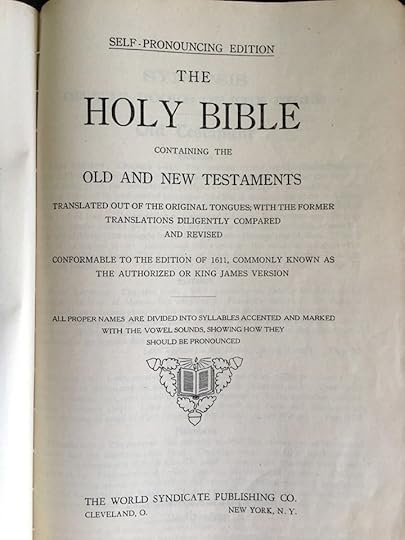
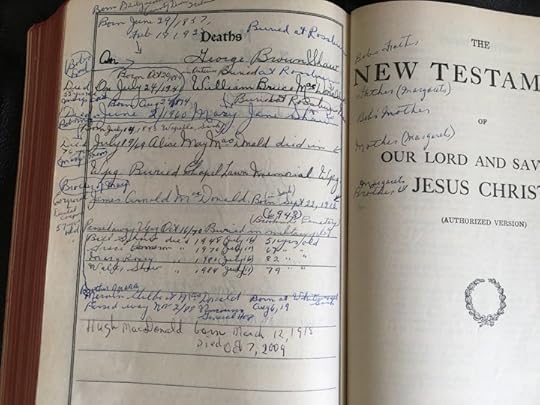
The inscription says:
Dear Robert & Margaret,
May the pearly gates of heaven,
So far from the Sea,
Open wide dear Robert and Margaret,
To welcome you and me,
To Robert and Margaret with love and best wishes,
From your ever loving Mother.
Mrs. M. J. Shaw
An Aside:
When I read that inscription a few days ago, I was floored. I'd read it before, but never connected it to the fact that this was an inscription to her son and his bride, or to the fact that my dad always used R. A. Shaw, and before I was married, my signature was N. J. Shaw before it became N. J. Lindquist. Mom's signature was O. Margaret Shaw, although she sometimes skipped the "O."
Not sure what this means, but it's kind of interesting, don't you think? I always get asked why I use N. J. Lindquist. Even my psedonym is J. A. Menzies. Maybe it's Granny Shaw's fault!
Granny Shaw also gave Mom and Dad cards with religious messages, various inspirational books and little red Bible tracts (I seem to have misplaced the one I had!) and at least one other New Testament. I have the New Testament and a tract called "What Happened with Mother Prayed."
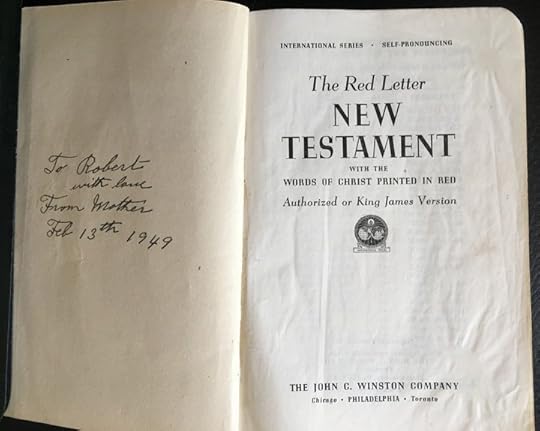
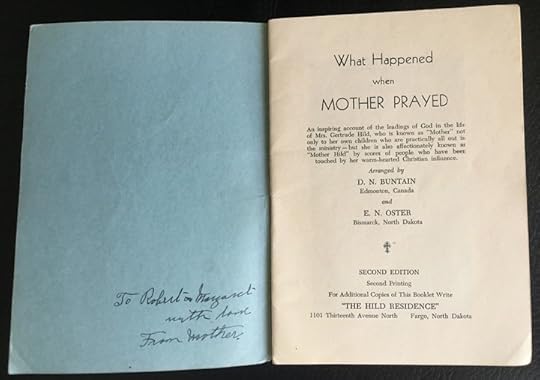
She gave Dad the New Testament for his birthday the year after I was born.
To Robert with love from Mother Feb. 13th, 1949.
She gave both of them the tract.
Speaking of prayer, I'm quite certain that she prayed for my parents, if not every day, close to it. She was determined that both my parents would ask Jesus to come into their hearts. And, of course, when I arrived, she added me to her prayer list, too.
And I just this moment realized how like her I am in this way as well. I often try to influence people through writing. Not just the hundreds of books I've given to family members and friends over the years, but I took it a step further and wrote dozens of op ed articles and blogs as well as a number of stories and books.
Wow! I might need to process that.
The two pictures below are the only ones I have of us together.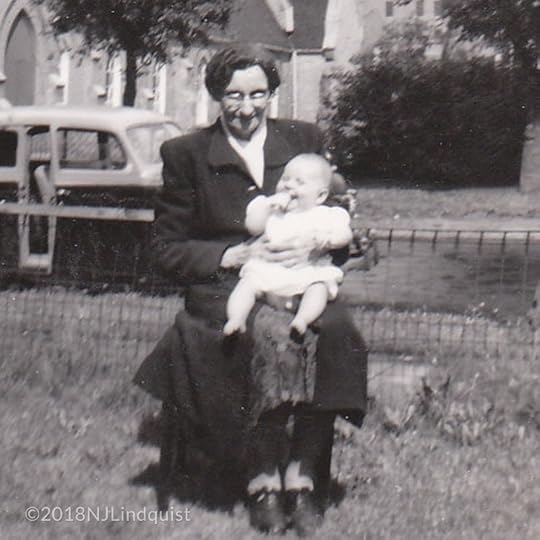
Our first meeting. I think she's smiling here. I certainly am.
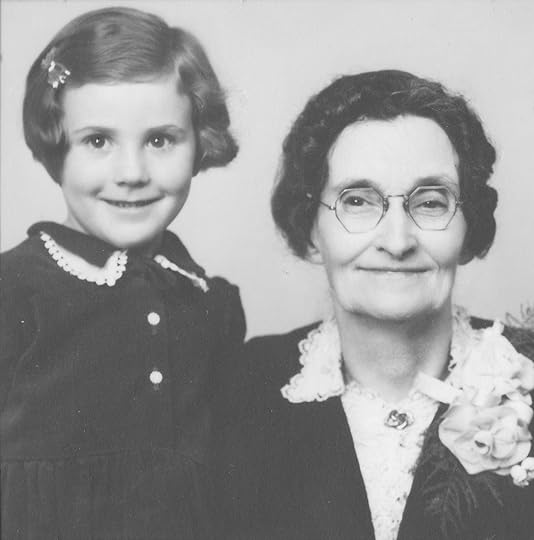
When I was six and she was 80.
Can you relate?
Granny Shaw was in a powerful presence in my life. Maybe more than I'd even realized before writing this.
Do you recall having a relative like her?
Or, perhaps a relative you realize you are like?
LoveChild: Life Lessons from an Ugly Duckling is the story of my struggle to adjust to the life I was given, and my eventual discovery that, not only had I become a swan but, contrary to my perceptions, I had always been one. Though I didn't realize it until many years later, my life was part of a much bigger plan that all made perfect sense.
I'll be blogging my story once a week.
You can find links to all these blogs at:
https://www.njlindquist.com/lovechild/
[image error]Have my new posts sent directly to your inbox.
Sign Up to Have All My New Posts Sent to Your Inbox
The post LoveChild 37: Granny Shaw Through the Eyes of a Six-Year-Old appeared first on N. J. Lindquist.

